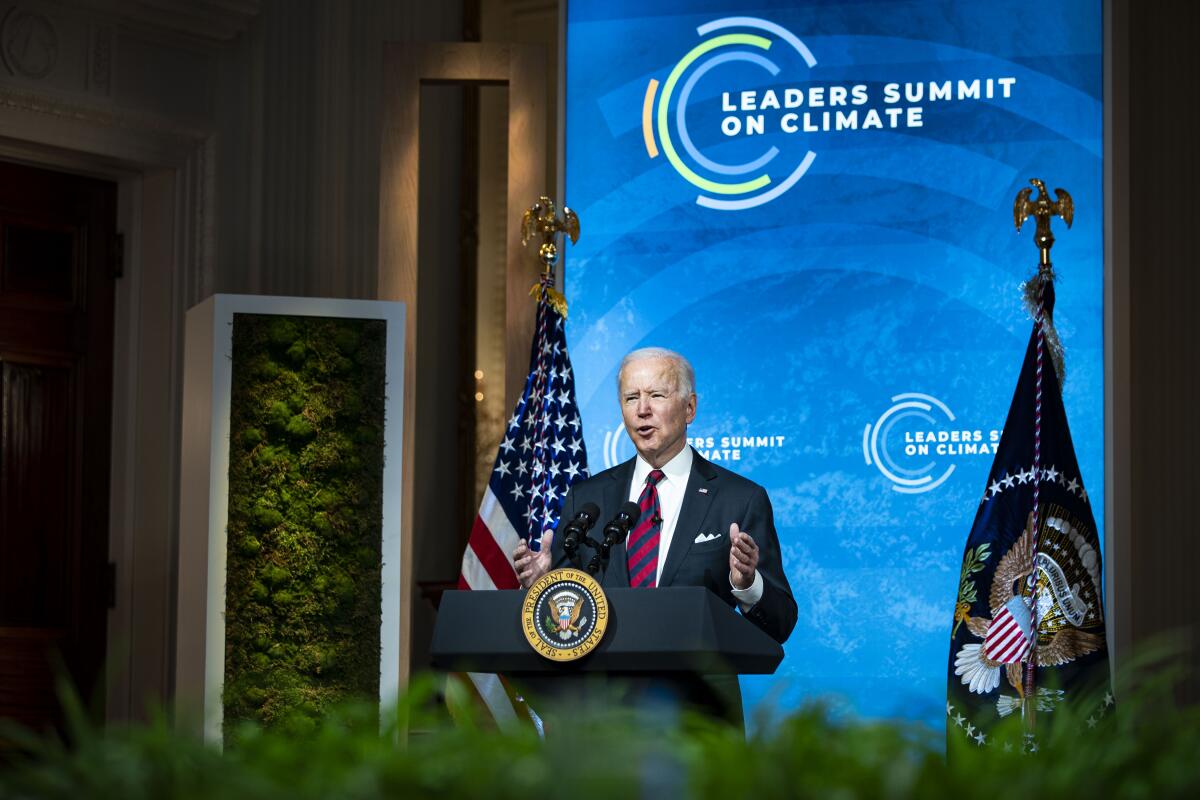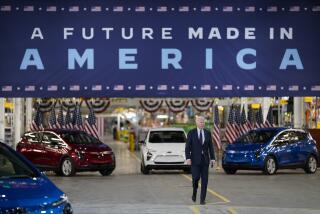Editorial: Glasgow is the moment to go big on climate change. But Biden is stymied by Congress

Over the summer, as the world reeled from record-breaking heat waves, flooding and wildfires, the United Nations issued a climate change report that connected the dots with terrifying clarity.
The world has moved too slowly to stop global warming and the increase in extreme and deadly weather events. But with radical action to cut carbon emissions over the next decade, we can still prevent the worst devastation.
Next week will test if world leaders are ready to act with the urgency this moment requires. Government officials, business leaders and environmentalists will gather in Glasgow, Scotland, for a two-week summit to hammer out new commitments to slash planet-warming emissions.
The COP26 conference is expected to be the most important climate event since 2015, when global leaders met in Paris and promised to cut their greenhouse gas emissions enough to stop the planet from warming more than 1.5 degrees Celsius above pre-industrial times. But nations haven’t done nearly enough to meet the Paris agreement target, so at this follow-up conference in Glasgow, world leaders will be expected to present concrete plans for how they intend to fulfill the promise.
It’s not that people don’t care about global warming. It’s just that they don’t seem to care in rational proportion to the enormity of the problem.
As of now, the Biden administration is going to Scotland with a weak plan that mostly relies on incentives to encourage emissions reductions but without the mandates or penalties to ensure the reductions actually happen — all because obstructionists and fossil fuel loyalists in Congress gutted President Biden’s most aggressive climate change programs.
That’s a disappointment because all eyes will be on the United States. President Biden has laid out an ambitious climate change agenda, including a goal to cut the nation’s greenhouse gas emissions 50% from 2005 levels by 2030. But the U.S. will never meet that target on pledges alone. It will take aggressive policies to reduce the nation’s reliance on fossil fuels to keep the lights on, power vehicles and heat homes.
It’s deeply frustrating that one of the most important pieces of Biden’s climate agenda — a plan to reward utility companies that use clean energy sources and penalize those that don’t — was yanked from the Build Back Better bill to coax a “yes” vote from Democratic Sen. Joe Manchin III from the coal-producing state of West Virginia. (Not a single Republican is expected to vote for the spending package, so Manchin’s support is essential. So much for the Conservative Climate Caucus.)
Instead, Biden’s Build Back Better plan now relies on $555 billion in tax credits and incentives to encourage companies and consumers to invest in clean energy. That will still be a huge help. If passed, it would be the largest single federal investment in climate change in history. Biden said all that spending could get the U.S. to hit its climate targets. (Though some experts are skeptical the president’s revised strategy will be enough.)
Thousands will attend the U.N. global climate summit. While hopes for a major breakthrough are slim, here’s what leaders hope to get done.
While Congress is inching closer to approving the Build Back Better plan’s tax credits and temporary spending, the nation really needs laws and programs that require utilities and energy companies to rapidly phase out fossil fuels. We’ve seen what happens when Congress refuses to be more aggressive. President Obama had to rely on incentives, executive orders and slow-moving regulatory processes to tackle climate change. But those efforts were rolled back by President Trump and the U.S. lost critical time and credibility in fighting global warming.
This is the moment when the world’s industrialized nations need to step up with real policies and programs that make real reductions in greenhouse gas emissions. The U.S. is doing a lot, but if the world is going to avoid greater devastation from climate change, we need to be doing much more, much faster.
More to Read
A cure for the common opinion
Get thought-provoking perspectives with our weekly newsletter.
You may occasionally receive promotional content from the Los Angeles Times.












